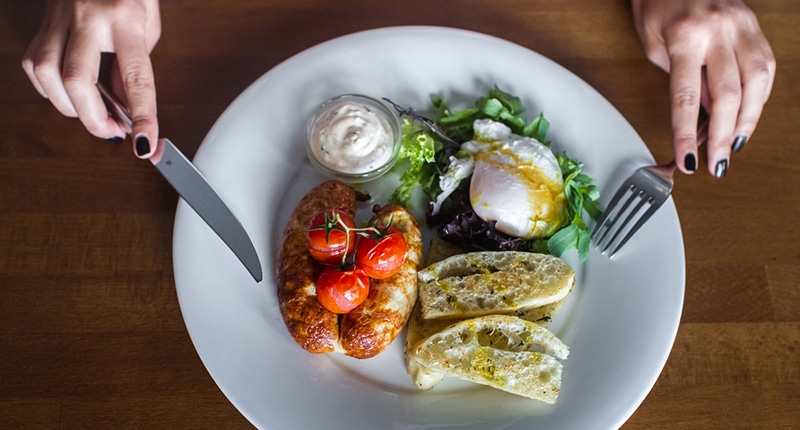So we have heard about impulsive eating and binge eating, but not everyone has heard of intuitive eating.
What exactly is intuitive eating?
If you are wondering what intuitive eating means, the simple answer is That intuitive eating is a feeding philosophy that makes you an expert of knowing your body and the hunger signals it gives you.
In essence, it is safe to say intuitive eating is the direct opposite of your traditional diet method.
One great thing about intuitive eating is that it doesn’t impose anything such as what to eat and when to eat it, offer even what food to avoid. What it does instead is to teach you that you alone are in the best position to choose what and when you should eat.
If you think you might find intuitive eating helpful and you need a beginner’s guide, you have stopped in the right place.
Let’s start with the basics
Intuitive eating is a great feeding style because it promotes a good and healthy attitude towards the food you eat and your body image.
The idea behind intuitive eating is simply eating when your body tried you that you are hungry, and dropping the spoon when your body tells you it has had enough food.
Although eating when you are hungry is suppose to be a natural intuitive process, but for some humans, it is not. Putting all your trust in cook books, professional dieticians, or so called experts whose job is to tell you what to eat and when to eat it, make you lose connection and trust with your body and intuition.
To engage in intuitive eating, you need to reconnect and relearn to trust your body and for you to do that it is vital that you know the difference between emotional hunger and physical hunger.
What is physical hunger?
Physical hunger is the biological way you’re body communicates with you when it’s time to replenish used up nutrients.
Physical hunger builds up gradually and sends different signals such as fatigue, irritability, and a growling stomach. Whenever you’re body sends these signals and you eat any food, the discomfort stops.
What about emotional hunger?
This kind of hunger is driven by a person’s emotional need. Emotions such as loneliness, boredom, and sadness can create the craving for food when you are not hungry in reality. When people eat to satisfy emotional hunger they may end up feeling guilty of hating themselves afterwards.
This means that physical hunger satisfied your body’s basic need for food and it doesn’t bring about guilt after feeding. Emotional hunger on the other hand doesn’t satisfy your body’s actual needs but act as a consolation for your sadness.
History of the term “intuitive eating”. The philosophy known as intuitive eating was was coined back in 1995 when it was used as a book title by Elyse Resch and Evelyn Tribole. However, the roots of this concept are embedded in earlier ideas.
Some people who are considered pioneers of the concept of intuitive eating include Susie Orbach who is the co-author of a book titled “fat is a feminist issue” in 1978, and also Geneen Roth who wrote about the subject of emotional eating in 1982.
Before all of that, a lady called Thelma Wayler founder the Green Mountain at Fox Run which is a weight management program in 1973.
The weight management program was created to promote the idea that dieting doesn’t work and lifestyle changes, as well as personal care, are the best option for long term healthy weight and feeding pattern.
Principles of Intuitive Eating
Now that we know the basics let us take a look at some fundamental principles of intuitive feeding. In the book by Tribole and Resch on intuitive eating pointed out ten basic principles and we are going to treat them in this article.
1. Reject the diet mentality
The first mentality we are talking about is the idea that has been sold to us that there is an ideal diet plan out there for everyone and finding your perfect diet will solve all your food related problems. Intuitive eating is entirely against dieting thus you can call it the anti-diet feeding plan .
2. Honour your hunger
Some people hate to get hungry, so they eat to avoid the pangs. However, it is not a bad thing to get hungry and satisfy your hunger. Hunger is your friend and should be respected by feeding when the early signs show up.
If overeating is what you are trying to avoid, then try not to stay too hungry before eating, so you don’t overfeed yourself.
3. Stop the battle with food
You need to make peace with food by eliminating the idea of what you should and shouldn’t eat because if you are at war with food, you find yourself dieting, and that isn’t what intuitive eating is about.
4. Challenge the authority of the food police
Food is not a bad thing, and you should never feel like you are a terrible person for eating certain foods as long as you are eating healthy and not harming anyone.
5. Respect your fullness
The same way your body signals you to provide food when it is in need of it, it also indicates you when it has had enough. Always remember to check-in with yourself to findout how your food tastes, how hungry you are, and whether or not you are comfortably full.
6. Discover the satisfaction factor
When you find food that tastes nice, make sure to enjoy every bite and try not to rush it. Once you can make your feeding a pleasurable experience, you will discover that it takes little food to get you satisfied.
7. Honour your feelings without using food
Emotional eating is a strategy people use to deal with emotions, and it can lead to some eating disorders. Find other ways to handle your emotional problems asides eating your pain away.
8. Respect your body
Fall in love with your body as nobody can live out the way you can. Let go of any negative though offer an idea about your body. Recognise that your body is beautiful and capable of a lot of beautiful things.
9. Exercise
Engage in exercise as much as you can with the aim to energise yourself and stay healthy rather than the do or die mentality of weight loss.
10. Honour your health
Make sure to eat right and avoid junk foods as a good feeding routine is what will shape your health eventually.








